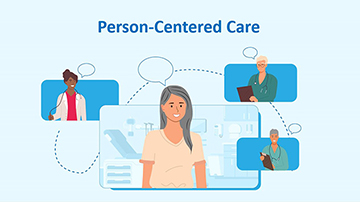 care at the center of a care network" width="360" height="202" />
care at the center of a care network" width="360" height="202" />In a value-based health care system, doctors and other health care providers deliver high-quality care using a person-centered care approach. This differs from a traditional fee-for-service system where patients get their health care from multiple, siloed specialists who focus on a specific health issue rather than patients’ comprehensive, long-term needs.
Person-centered care includes:
 care at the center of a care network" width="360" height="202" />
care at the center of a care network" width="360" height="202" />
Tyler meets with his doctor about breathing problems and is diagnosed with asthma. In addition to prescribing Tyler a rescue inhaler to treat the symptoms, his doctor follows up with a telehealth visit to identify contributing factors, including smoking and his current living conditions, and develop a treatment plan. Together they come up with a comprehensive plan that considers Tyler’s related health, behavioral, and social needs. For example, the plan includes connecting Tyler with a smoking cessation program when he is ready to quit. The plan also leverages community partners and public services who can help him understand what in his apartment might contribute to his asthma and where he can get help to improve his living situation.
For more information about the CMS Innovation Center’s new strategy and the future of value-based care, visit our Strategic Direction webpage.